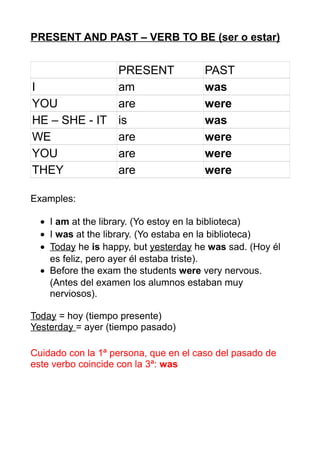Present and past of the verb TO BE
•Transferir como DOC, PDF•
2 gostaram•35,503 visualizações
Denunciar
Compartilhar
Denunciar
Compartilhar

Recomendados
Mais conteúdo relacionado
Mais procurados (20)
Destaque
Destaque (20)
Semelhante a Present and past of the verb TO BE
Semelhante a Present and past of the verb TO BE (20)
Guia Verb To Be Present Simple Alphabet Recoleta 2010

Guia Verb To Be Present Simple Alphabet Recoleta 2010
III- Cuando era niño- Gramática- El imperfecto- Apuntes

III- Cuando era niño- Gramática- El imperfecto- Apuntes
Mais de Elena Vazquez
Mais de Elena Vazquez (18)
A day in the lives of Jensen Ackles and Jared Padalecki

A day in the lives of Jensen Ackles and Jared Padalecki
Present and past of the verb TO BE
- 1. PRESENT AND PAST – VERB TO BE (ser o estar) PRESENT PAST I am was YOU are were HE – SHE - IT is was WE are were YOU are were THEY are were Examples: • I am at the library. (Yo estoy en la biblioteca) • I was at the library. (Yo estaba en la biblioteca) • Today he is happy, but yesterday he was sad. (Hoy él es feliz, pero ayer él estaba triste). • Before the exam the students were very nervous. (Antes del examen los alumnos estaban muy nerviosos). Today = hoy (tiempo presente) Yesterday = ayer (tiempo pasado) Cuidado con la 1ª persona, que en el caso del pasado de este verbo coincide con la 3ª: was
- 2. NEGATIVE AND INTERROGATIVE FORMS Al igual que sucede con el presente, la forma negativa del pasado en el verbo TO BE se forma añadiendo NOT al verbo, de modo que nos quedan dos formas: wasn´t y weren´t. Examples: − I wasn´t at school at ten o´clock, I was at the doctor. (Yo no estaba en el colegio a las diez, estaba en el médico). − The lion wasn´t hungry. (El león no estaba hambriento). − You weren´t ready for the exam. (Vosotros no estabáis listos para el examen). En cuanto a la forma interrogativa, las frases se forman igual que en el presente, es decir, el verbo pasa a ocupar el primer puesto de la oración. Examples: − Were you at the library at half past ten? (¿Estabas en la biblioteca a las once y media?) − Was she Maria´s mum? (¿Era ella la madre de Maria?) − Were they famous? (¿Eran ellos famosos?)
